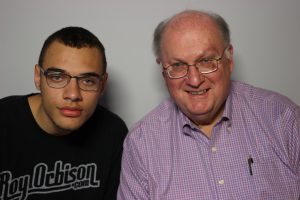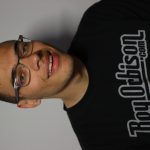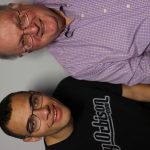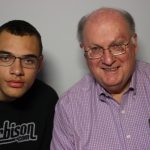Timothy Kelly and Patrick Kelly
Description
Timothy M. Kelly (69) tells his grandson, Patrick Kelly (18), about his 46 year Newspaper career and gives him advice about finding his passions.Subject Log / Time Code
Participants
- Timothy Kelly
- Patrick Kelly
Recording Locations
Lexington Public Library, Eastside BranchVenue / Recording Kit
Tier
Initiatives
Keywords
Subjects
People
Transcript
StoryCorps uses Google Cloud Speech-to-Text and Natural Language API to provide machine-generated transcripts. Transcripts have not been checked for accuracy and may contain errors. Learn more about our FAQs through our Help Center or do not hesitate to get in touch with us if you have any questions.
00:04 My name is Patrick Kelly. I'm 18 years old and today's date is March 24th, 2017. We're in Lexington Kentucky and my relationship to my partner is that he's my grandfather.
00:17 My name is Timothy M Kelly. My age is 69 today's date is March 24th, 2017 where in Lexington Kentucky and my relationship to my interviewer is I am his grandfather.
00:33 I want to start off with a I was wondering what your most memorable childhood experience was my most memorable childhood experience. Wow, that's a great question. Probably. The very first time I went to Crosley field in Cincinnati Crosley field was where the Cincinnati Reds played and I was a huge Cincinnati Reds fan and I know it was the old ballpark in Cincinnati and I never been there and and we lived in Ashland, which is about 3 hours away and came into Crosley field. I never seen grass so green and it was a night game. It was a game when the players came up into the stands and got him. You got to meet them and I got to meet my my idol who was Ted kluszewski the the Reds first baseman who was a huge guy who wore cut out the sleeves of his shirt cuz he had such big arms and
01:33 The show off the muscles in his in his arms and it was I was just a little kid probably eight or nine years old and I got to meet and got to meet my idol in at the Crosley field in my first time there.
01:48 All right, and I also want to know who had the most impact on you throughout your life or someone you looked up to.
01:58 It's a good question Patrick.
02:03 You know everybody you want to look up to your parents and certain way I did I did look up to my parents, you know, my mother and my father but also had other people I looked up to and and in my career I had two people in particular that I looked up to a gentleman named Eddie storm who hired me at the Miami Herald when I was 20 years old and I had no business being hired there at that time and he he was a real role model and a great family was a Catholic guy like like me in and they had like five kids and was he was he was just a superb person as well as a great boss in a real Taskmaster and then another fella named will cherish it who was my boss in Philadelphia Dallas and Denver and he really helped make my career and and
03:02 And I actually our families live a live by the the the opportunities that that he gave me. Unfortunately right now, he's 81 years old and he's in a Alzheimer's memory care unit in Texas and I can no longer talk to him and he can no longer. He doesn't he wouldn't recognize me anymore, which is really sad.
03:27 All right. So what motivated your decision to go into journalism? Well, I didn't want to shuck corn and Sack groceries at Kroger's all my life, which was my first job and I love sports. I played high school basketball as you know, and I love to write and I had an opportunity to right out of high school in the fall after my high school ended my freshman year in college to take ball scores over the phone for the local newspaper. And I really loved it. I love the people and I love to love doing that and then they started letting me write a story or two or three and and it just went from the Aaron and I loved it and I never stopped doing it for almost forty six years.
04:18 Did you ever personally experienced those Civil Rights Movement personally experienced it. I can't say that I did but you know journalistically, you know, it was during your that time during the 60s and the 70s, you know, one of my one of my enduring most stirring memories is of the first week in April of 1968. And this is a personal memory because Martin Luther King died on April 4th 1968. My father was ill and in the hospital that week. I'll Tokyo home unexpectedly. He died on April 8th 1968 and I recall watching the services and so forth.
05:18 Martin Luther King and and all the all that went on during that during that time that week out while I was also watching my father died and that we made just made it changed it part it made incredible impression on me in and was something that I've never forgotten and I remember those two dates every year when they come up April 4th and April 8th because of because of what happened then
05:53 However, journalistic ethics change throughout your career move changed enormously when you know when I first started if you know newspaper journalism was kinda coming out of her a new robe, you know, it was kind of like yellow journalism tabloid journalism kind of anything goes there weren't a lot of Journalism organizations in the time that that I was coming of age as an editor in newspaper in there. A lot of organizations formed associate, press managing editor Associated Press sports editors American Society of newspaper editors really became very strong each and every one of them develop their own codes of Ethics in terms of how newspapers and journalists and editors should act they a lot
06:53 Women created reader Representatives or Ombudsman. So that readers or story subjects could I could complaint had somebody to actually complained to and takes her complaints to and have them addressed so newspapers, I think became a far more as a go in terms of even smaller than a relatively small things like what they could take from people, you know, however, they could take meal from somebody that maybe they they covered or so on so forth or you know, where they even in sports in the in the Press Box has you know, what kind of meals or swag it would feel to be at work when you go to a track meet and you get swag? Okay. So used to give out give out a lot of Swag the sportswriters. Well, you know that things Super Bowls and an Orange Bowl
07:53 Rose Bowls and all that stuff will that we have that pretty much all went away. So as not to create any kind of of appearance of being influenced by goodies or favorable treatment or so so far. So, you know, I saw ethics change in in major ways over you over the time that I was I was never but going back to the Civil Rights, but I think there was there were a number of newspapers. I particularly in the south of us a real slice of newspapers not all of them certainly that really embrace the civil rights movement and and helped push it Forward. They were kind of the Southern liberal.
08:53 Yes of papers like the Atlanta Journal-Constitution with a guy named Ralph McGill St. Petersburg Times Raleigh News & Observer The Courier-Journal. Unfortunately, I can't say that the Lexington paper was one of them because it wasn't but there were there were or there was a Cadre of newspapers that really saw what was happening and embraced it and and pushed it and in the reading some of the readings. I've done like representative. John Lewis is set, you know, it was a civil rights movement couldn't have made the strides dead without the media focusing on it. Not just the print media but a TV media like when the police dogs worm you were trained on the protesters and when the videos of the protesters were were were beating on the Selma bridge and when the the fire
09:53 Roses were turned on protesters and when I when there were protesters sitting in at lunch counters, and so forth the media put that out there in the end and one in some way. So particularly some of those shocking images really that the media put out the really help push forward. I believe the other civil rights movement during the during the 60s and the 70s.
10:23 What was the most memorable like either positive or negative story you ever covered?
10:29 Patrick they're just so many of me. I was like me knows a 46-year career. I don't know memorable. I guess I would say was the most satisfying and most memorable one involved one that that I had a heart and why was Banshee of the Denver Post? I had hired a young very young very green very ambitious photographer from the Chicago Sun-Times named Tony swallow and it came to me and it one time and he said I was too, you know, there's a famine in Ethiopia and I said, well Tony there's kind of like always a famine in Africa recent know but this is this is horrendous and he said the Western media and cover it because no no Western media has been allowed into into Ethiopia and he said, but I can get that I can get in.
11:27 And I said, how can you get in? He said I have I have friends within Catholic relief services that can get me in and I can get in and I can get the pictures out and and I taught thought about I said, well, there's no way or publisher is going to let me send you the Ethiopia. We worked out a deal where you took a leave of absence went to Ethiopia and I would pay him when he came back as a freelancer and then put it back on staff after the leave of absence. He he went got in brought back pictures. He I we probably see the pictures in November of 1983 a phenomenal pictures. You've seen him there on the wall of my office at 1 they won the Pulitzer Prize in 1984. We didn't think we had one typically when in people working for me one for Pulitzer prizes, but this is to me the most
12:27 The most memorable because I had such a hand in it. Usually you get kind of your back door. Somebody gives you a call that you're going to win that next day. We didn't get that call. He was so disappointed. He went home to Chicago and we were disappointed. We thought we were going to win and I'm standing in The Newsroom over a guy's shoulder watching the computer as The Poets are results come in and there is his name Tony swallow.
12:59 Pulitzer Prize featuring photography Denver Post and so I sent my assistant now to get as many bottles of champagne is he could find in downtown Denver and it's faster. Of times, it could fast-forward about three months later. The British Broadcasting crew goes gets into Ethiopia comes out in with the video of what was going on in there and it shocks the world and that created the whole We are the world we are the children movement and I've always felt that without what Tony did on his own one guy one journalist, you know doing that on his own.
13:46 You know that that whole movement might not have happened so that to me. It's the most memorable story of 4546 your career.
13:57 How did becoming an editor change your life or your career change in the number of ways one that I wound up moving from place to place to and following the man that we talked about. Mr. Jared will Jared because he got promoted or took different jobs and I followed him. We met up in Philadelphia and I actually have been in Miami as I die and not newspapers bought which island Miami bought Philadelphia. And so he and his boss went to Philadelphia man. They have remembered me from Miami so
14:39 They brought me to Philadelphia and then he got became magic out of the Dallas Times-Herald. I went with him and then he became editor of the Denver Post and and I came with him is managing outdoor. So becoming an editor.
14:56 Created some of the moves that our family made that that you know, you know went down fairly well with with Uncle Kevin didn't go down very well with your mom that. Didn't you know, she didn't take well to the various moves that we made it was harder on her cuz it was a time when she was a grown-up and and and that on that unsettled her and that's one downside to it the other side to it is you know, it it hand star families lifestyle because every move was a promotion and I remove the loudest music that will allow me to have to make more money until I have more responsibility and bigger major steps in my career. And in reality they all prepared me for the one thing that I really wanted in my career.
15:56 Even though I'd worked in bigger markets and had bigger jobs. Don't the one thing I wanted to do above always come back to Lexington. KY one near is a sailing and there's a saying it's been described to Colonel Sanders or or happy Chandler the old baseball commissioner and said if you take either one of them said, is there American talk to you new one coming home and that was me. I always want to come home. Even when I was living, you know, when in Miami and Philadelphia and Dallas and Denver and then La always want to come home and I wanted to be Lexington me know because I think it was great town and I was also Knight Ridder newspapers, which I thought was the best newspaper company to work for it. I'd work form in Miami in Philadelphia.
16:46 And I think all that the other jobs would be in and out of her prepared me for coming back here which is which is the one job I wanted but I never expected or wanted to be a publisher which eventually is when I became for the last 15 years of my career but things happen if you could go back and change anything about your career about your life for a big decisions in your life. Would you change anything? Yeah.
17:17 You know is any in anybody's life of me. I'll be 70 years old this yo this November me and you all at me look back. There's any number things you do, you know you could you wish you could do better you no regrets you have things you could change none of what you can do anything at all about, you know, the only thing you can impact is the present and in in the future, you know for a long time in early in my career and early in your mom's life. I was working a lot of really long hours and a lot of nights in a lot of weekends. We have started when I was a teenager and Ashland and 65 and your mom was born in 1970 and it really wasn't until 1981 that I wasn't working like Saturday nights and a lot of other nights and
18:17 A lot of really long long hours. So, you know, there are a lot of nights and times we're particularly win before Uncle Kevin was born that it was just a moment and your mom at home by themselves at night because I was working cuz I was in sports or on the news desk with you work on a morning newspaper morning news paper gets put out at night. That's where I was because those were the roles I had so I think that something I wish I could have changed but it just knew was what came with the jobs and I never would have, you know, the chief of the the positions I had if I hadn't done, you know put in those kind of hours in that kind of grunt work on the front end of my career, but I'm I regret that then cuz it it did take away from time.
19:17 Early in her life that I couldn't might have been able to spend more time with your mom.
19:24 How have you seen the decline of the newspaper?
19:28 And is it just because of the rise in technology and easily accessible great question about Drifters there the the newspaper business was rolling along fat and happy probably it's it's reached its apex during the time that I was really young Neil coming really coming of age isn't as an elder and even into my certainly my first five or ten years is a publisher into the public damn newspapers went from basically being on from families in towns, like Lexington and Louisville are classic examples, your own families didn't take very much money out of newspapers guy in the old days. They took what they needed and and put the rest of it back into the end of the papers and and then newspapers started getting
20:28 Bought by corporations publicly held corporations became became the holding the stock holders on Wall Street Louisville Ms. Now to it with kinnett and Lexington was with Knight Ridder and now with the clutchy publicly held companies that anticipate certain level to profitability. Those were able to be achieved to Great degrees particularly in the in the in the 70s, which is when that this whole Trend started in the 80s and into the into the mid-90s with computerization computerization allowed allowed newspapers become far more efficient and to do what they did on the production ends of things with a lot fewer people there for profits went through the roof guy and and then the
21:28 Turn that happened this paper here and Lexington was the third Knight Ridder newspaper Knight Ridder being a Pioneer in online. We were the third Knight Ridder newspaper to go online in December 15th of 1996 and with between 1996 and they say the year 2012 all game changed because the so many competitors, you know came came into the market while Yahoo and Facebook an AOL. You name of the they started rotating newspapers traditional profit basis, which were classified advertising for automobile and real estate and help wanted and that's what really a precipitating the decline in newspapers was the decline.
22:28 In advertising not to decline and content but the decline and advertising revenues and is advertising revenues declined their newspapers have to start cutting and cutting and cutting and cutting and that is and that is why you know, I retired early. I've been publisher for 15 years. I had done so much cutting and I just simply did not want to do any more. I got to that point where you know, I was I was I was just I had enough of cutting the product and laying off people for no other reason than the fact we had to do that to me or to maintain profit levels that I was to a point where financially I was able to do that and that I was close enough to 65 or I could I could do I could I could get the Medicare in and be able to you know to to retire so but
23:28 The internet changed everything and it does what they call disintermediation that it blew up the entire advertising base, you know for four newspapers and newspapers are still trying to deal with in still trying to cope with us. News. Just newspapers me local TV stations have the same here kind of have the same issues as me know as well. They just aren't as well publicised.
23:57 Okay. The last question I had was.
24:01 Do you have any advice for me for when I graduate high school? And what exactly did you do after you graduated high school? Did you go straight to college and
24:13 Just I'm just curious. Yeah, I went I went straight to college. I know that was just what you did. I didn't get to go.
24:26 The coward's way I wanted to go to college, you know, I was the top I went to as you know, a very small high school. We had only honor 20 kids on top for grades. And and I think we had 36 students in my graduating class, which at the time was the largest graduating class in the history of the school, but I had gotten some partial. I got a couple of partial scholarship offers not for my basketball abilities, but throughout for academic the bill and old abilities from Morehead State and a Catholic School call John Carroll up in Cleveland, and I desperately wanted to go away. I want to go away to college somewhere cuz I've been Ashlyn. You know my whole life and my parents didn't have any money send me why the only other option was to pray.
25:26 Maps get a Diocesan scholarship live from the Covington diocese that allowed the top graduate in each High School in the diocese to get a full-ride scholarship to a school is called Villa Madonna to time which is now Thomas More which is Uncle Kevin went for his freshman year will be a wee wee salt remember what it was then when we do it our tour up there of of schools in Northern Kentucky and it went to the top high school graduate in each tune each school, but there were three girls out of me and I was the top boy, but there are three girls head of me while the first girl turned it down. She was going to Ohio State the second girl was going to get into University of Louisville and a handsaw third girl and it was coach Doug's mom.
26:21 And the and she took it so I didn't get to I didn't get that scholarship. So my parents didn't have any money to send me anywhere else. So I had to go to the Community College three blocks up the street at the Ashland Community College from the University of Kentucky. And that's where I started and I was not happy about it all and so as soon as I could you know, how I got my job at the Ashland paper part-time job at the Ashland paper and then within a year I am I applied for and got a full-time job at the Huntington paper work been started enough of it so I can transfer to Marshall and so I was working full time and going to school full-time that was before I transfer to to University of Miami full. I got the job post 20th at the Miami Herald. My my vestory should have absolutely no impact on what you do on your influence on what you do what
27:21 What you should do is what you think is right for you. Okay, and whatever you want to study what you're interested in is you know as is my advice but you got to figure that out, you know with your with your mom and your dad and and your counselors your coaches, you know, you got to decide whether you want to continue to jump in college and if so where you know, hopefully you get an offer sometime pretty soon and you don't have to declare a major right off the bat, you know, you can go in with a General Studies me like your first year and you kind of get a better feel you know for for what really interests you I mean you've talked about about business and political science. Those are pine. Those would be great. You know. Nobody is going to hold you to that.
28:21 You know, but you know, it's it's going to have a passion for what you do, you know Nann like when when I'd be so kind of stumbled into my you my part time job with that Ashland paper, you know, I discover my passion and I never lost it, you know, one of the questions your mom put up here was it would have you ever considered had you ever considered ditching the news and going into another career? I was put here never was my passion. I loved it. I couldn't possibly have thought of ever doing anything else because I loved what I did and I never let you know I'm done till the last couple years because of things I had to do before on the business side of it on me. I just really never lost the passion for it. So, you know, you'll discover your passion if you don't have it right now.
29:19 But you know you just you and him just think and think about what you want to do and you may change, you know, people change their majors in college is all the time people change colleges, you know, they start at one place and go someplace else that's there's nothing wrong with that. I went to three different colleges, you know, but my my College college has fallen mine jobs here. I got the job at the little paper and then I got a job a little bit bigger paper and then I got a job with a really big paper, but that was really unusual and not to not to be you. I don't think you imitated or more replica. Don't know it could be done these days anymore.
30:09 Was it hard to balance your job and school? Absolutely. It was it was really hard. You know, I didn't have any social life, you know, thankfully, I'll put up with a lot and then we dated off and on but you know, she was the only girl really that I dated in there any degree. Nobody else would put up with my hours, but I never went to a single dance in college. You know, why would there were times when particularly in Miami? Cuz I would work till midnight or 1 and I'd have 8 a.m. Classes. There were times that I would just stay in The Newsroom all night and study and I can remember seeing the sun come up over Miami Beach because
31:09 News that the newspaper building was right on Biscayne Bay across from across Miami Beach and I'd stay up all night and and and study like for a test if I had a paper to do go ahead and let you know that a lot of ya Nabi salaam on typewriters around and saw it being sacrificed a lot and I put myself through school the last, you know, three three and a half years and I remember one thinks giving you the first Thanksgiving is I was in Miami before him and I got married. I mean I do have any money and I had not gotten me a check cashed before Thanksgiving and I thought the Miami Herald cafeteria be open I get some dinner. He always get something to eat there then that day cuz I was going to be working. Well though it wasn't and I wound up having SpaghettiOs.
32:09 Is an orange soda for my Thanksgiving dinner in my $55 a month on heated and air-conditioned Department, you know on the street or no, but I was the only person who spoke English as a first language in Miami. So I mean it was Vino Vino my love. I had one apartment in in Huntingdon just down from down the street from Marshall. Let my dad shortly before he died came up and saw where I was living and just told me he wanted me to out of there and he's so I can't believe you're you're living here on us looking for in this August.
32:47 Promise me you'll get out of here. So a man beside me sacrifice sacrifice. Yeah, but you know it it all worked out and you know, I didn't grow up rich, you know, you seen the house I grew up in cross the street from the train station in Ashland United Crow, you know, we didn't we didn't have very much so I didn't eat very much, but I was willing to work for it and I work for him everything. I mean when a man I got married we never dime.
33:18 Then I have a few bucks on them checking account, but I was at but then we can we worked hard and it was the last semester in college and we made it work, you know, Serena mine real time to my story, you know.





